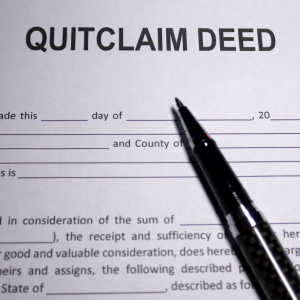
Transferring property ownership in Pennsylvania can be done quickly and efficiently with a quitclaim deed. This guide Nura Home Buyers will go through the essential steps to create and file a quitclaim deed, helping ensure the process is clear, legal, and straightforward.
Understanding the Pennsylvania Quitclaim Deed
The Pennsylvania quitclaim deed is a legal document that lets people give up their rights to property. It passes ownership without warranties, which is different from other forms of deeds. This makes it very important to know how and when to use it. This unique deed has a lot of information that you should know about, whether you’re moving property between family members or clearing real estate titles. What a quitclaim deed is and what makes Pennsylvania’s quitclaim deeds special are two important things to look into. Learning more about these subjects can help both grantors and grantees, whether they are buying or selling property in the state.
What is a Quitclaim Deed?
A quitclaim deed is a legally enforceable document that lets one person (the grantor) give up their interest in property to another person (the grantee) without any promise of clear ownership.
Quitclaim deeds don’t safeguard or guarantee against claims from other people on the land, unlike warranty deeds. This means that the grantee only gets the interest that the grantor legally has, which could be very little or perhaps none at all.
Because of this, these deeds are typically used in deals between people who know each other, such as when family members or divorcing spouses give each other property. Quitclaim deeds can also be used to fix title problems when someone’s name is wrongly listed on the title.
These deeds can also help when someone wants to add a co-owner to a home or when someone wants to move ownership in and out of a trust. It is very important to understand the hazards that come with not having warranties, especially for people who are buying real estate.
A quitclaim deed is not usually good for sales because it doesn’t come with any guarantees. Instead, it works best when both parties trust each other, which ensures that the property transaction isn’t ruined by unexpected claims or legal problems.
Key Features of a Pennsylvania Quitclaim Deed
Some important differences exist between a Pennsylvania quitclaim deed and other similar deeds used to transfer land.
Initially, the deed’s simplicity is noteworthy; it usually only includes the names of the grantor and grantee, a clear description of the land, and the conveyance statement. Although the Pennsylvania quitclaim doesn’t need any complicated formal guarantees, it is a quick way for family members to transfer property or settle estate disputes. Although it is informal, the paper needs to be very careful with every detail.
Legal descriptions of properties must be included in Pennsylvania quitclaim deeds so that there are no disagreements about the property’s borders or the scope of the transferred interest. To make sure the deed can’t be easily contested, they also require that the grantor legally sign the paper in front of witnesses and commonly a notary. In addition, recording the transaction with the county recorder’s office makes it more official in public records, but it’s not required to do so. Although this step is purely administrative, it is very important for protecting the new owner’s claim to the land in future dealings. Dealing with these complicated issues goes more smoothly and causes fewer legal problems later on.
The voluntary nature of the transfer is also emphasized in Pennsylvania quitclaim deeds, as the grantee is not required to buy or live on the land. In situations where standard acts aren’t appropriate, this trait often makes it easier to do non-traditional deals. It is important to communicate clearly and do your research before using these legal tools, because the donor is responsible if any rights are lost or claims are made that were not expected.
Looking to sell your home for cash in Pennsylvania? Nura Home Buyers makes it simple with fast, hassle-free closings on your schedule. Receive a competitive offer and move forward with confidence, stress-free.
Steps to Complete a Quitclaim Deed in Pennsylvania

There are a few important measures to take in Pennsylvania to make sure that a quitclaim deed goes well and the property ownership changes hands. This kind of deed lets you transfer property rights without any guarantees. It’s usually used between people who know each other. To make a genuine Pennsylvania quitclaim deed, you need to know the legal requirements, like how to file it and what to do to show that you did. The next sections go into great detail about how to file a quitclaim deed in Pennsylvania and what needs to be done to make the transaction legal. Following these steps carefully will make sure that the transfer of property is both legal and acknowledged.
How to File a Quitclaim Deed in Pennsylvania
Executing a quitclaim deed in Pennsylvania demands careful consideration of various legal details to ensure the property transfer is completed correctly.
To start, it’s essential to acquire the appropriate deed form, which contains detailed information regarding the grantor, grantee, and the property in question. Make sure the legal description of the property is precisely recorded, highlighting details like boundaries and any relevant restrictions. Errors in this area may result in conflicts or nullification.
The deed should contain a clear statement of conveyance that outlines the grantor’s intention to transfer all interest in the property to the grantee, even in the presence of potential debts such as tax liens. Once the form is completed, it is essential for the grantor to sign the document, a step referred to as deed execution. For this signing to maintain its legal validity, it is essential that it be witnessed and ideally notarized.
After obtaining the notarized deed, it is essential to submit it to the county recorder’s office in the location of the property. This step ensures that the transaction is recorded in public records, thereby reinforcing the grantee’s claim. Although it’s not mandatory, seeking advice from a legal expert is generally a wise choice to prevent errors that could complicate the title or lead to unforeseen legal issues.
Submitting your application also necessitates the payment of relevant fees, as well as a potential realty transfer tax. There may be particular exceptions that come into play, especially in cases involving family matters or specific estate planning situations. By following these filing steps carefully, you can make sure the quitclaim deed is legally binding and successfully transfers ownership, helping to avoid any future disputes.
Acknowledgment Requirements for a Valid Deed in Pennsylvania
The legal validation process for a Pennsylvania quitclaim deed is mostly based on how well the acknowledgment criteria are met.
When the grantor signs the deed in front of a recognized official, like a notary public, this is called acknowledgment. This step shows that the grantor actually wants to sign the agreement and keeps everyone safe by making the deed legal in court disputes and business deals. It is very crucial to follow these rules; if you don’t, the deed may not be legitimate, which could make the property transfer invalid.
The notarial acknowledgment is a means to make sure that the grantor truly did consent to the contract. This makes it less likely that fraud or coercion will happen. Before the deed may be recorded in Pennsylvania, the grantor must correctly sign it. The notary public’s seal and signature prove that the individual signing the deed is who they claim they are and that they agree to it of their own free choice. This keeps the rights of both the grantor and the grantee safe.
This acknowledgment isn’t just a formality; it’s needed for the deed to be valid in court. You could face major problems, like having the property title questioned, if you don’t meet the standards for acknowledgment. So, it’s very crucial to pick a good notary and make sure you follow all the steps.
To legally and properly transfer property rights, you need to know these rules as well as the bigger Pennsylvania deed requirements. This will make everyone involved in the deal feel better.
At Nura Home Buyers, we buy houses in Philadelphia and other areas, offering fast, fair offers and a simple, hassle-free process.
Comparing Quitclaim Deeds with Other Property Transfer Methods in Pennsylvania

When looking at ways to transfer property in Pennsylvania, it’s important to know the subtle differences between quitclaim deeds and other procedures. Quitclaim deeds are different from other types of deeds because they are simple and don’t come with any guarantees. They are commonly used for transfers between family members or trusts. On the other hand, warranty deeds offer more protection because they guarantee the property’s title against claims. This section explains why someone might prefer a quitclaim deed over a warranty deed and gives helpful tips for using both legal forms of estate transfer. It’s important for both grantors and grantees to make these comparisons so they may choose the option that works best for their real estate needs.
Why Choose a Quitclaim Deed in Pennsylvania?
Choosing a quitclaim deed instead of alternative ways to transfer property typically depends on the situation and the relationship between the people involved. One of the main reasons to use a quitclaim deed is that it speeds up the procedure. In Pennsylvania, a quitclaim deed is easy to use, which makes it simple to transfer property. This is especially useful when making changes to a trust or settling an estate. This efficiency is helpful when transferring property within a family or taking a name off the title without getting into a lot of legal trouble. A quitclaim deed doesn’t have warranties, as a warranty deed does. Instead, it only transfers whatever interest the grantor has. This can be especially enticing to people who know the property and the people involved well, since it swiftly transfers any stake without much legal trouble.
Quitclaim deeds are also great for clearing up any prospective title issues. If a grantor accidentally mentions another person on the title, in that instance, a quitclaim deed quickly fixes the mistake by giving the original owner back their interest. This deed’s structure makes it easier to quickly fix these kinds of problems without having to worry about a clear title, which could otherwise lead to long legal processes. Also, Pennsylvania quitclaim deeds don’t come with title guarantees, which means that parties have to do their homework and make explicit agreements with each other. This lowers risks through mutual understanding instead of legal guarantees. This aspect highlights their appropriateness in familial settings, where reciprocal trust might obviate the need for formal promises characteristic of alternative approaches.
To sum up, choosing a quitclaim deed means putting speed and confidence ahead of warranties. It works well for simple transfers between family members or people who have known each other for a long time. There is no need for strict title searches, which makes the process easier. Instead, the focus is on the legal formality of the grantor’s interest transfer. So, when the conditions are right for these simple techniques, a quitclaim deed is the best option because it makes property swaps quick and easy without any arguments.
Quitclaim Deeds vs. Warranty Deeds
When you compare quitclaim deeds and warranty deeds, you can see important differences that you need to know about in order to make smart choices about property transfers. A warranty deed basically tells the grantee that the property has clear ownership and that the grantor has the right to give it to them. On the other hand, a quitclaim deed doesn’t offer any of these promises; it only transfers the grantor’s interest or claim, and there may be unknown debts. The difference between the two means that the grantee takes on more risk in the case of quitclaim deeds.
People who are selling real estate often choose warranty deeds because they protect the buyer from any possible title problems and promise the grantor’s clear title. If problems happen, the grantee can go to court against the grantor for breaches. This gives the grantee a safety net that isn’t present in quitclaim deals. This makes warranty deeds very useful when dealing with new, unknown parties, because they make sure that ownership is clear and that there is future recourse.
On the other hand, quitclaim deeds are better for trusted transfers where the risk is low and getting a warranty is not necessary because they are easy to use and quick. Examples of these situations are family dealings or changes within a business. Not having to do detailed title searches also cuts down on transaction costs and the time it takes to go through the process, which is helpful when time is of the essence. These benefits come with the caveat that the grantee needs to be more careful and do a more thorough personal evaluation of any possible title problems.
When to use each type of deed in Pennsylvania depends on the type of transfer and whether speed and ease of use are more important than security and guarantee. So, quitclaim deeds work best in non-business situations and build trust, while warranty deeds offer strong protection that is perfect for buying a new home and balance instant legal certainty with long-term peace of mind.
A quitclaim deed transfers whatever ownership interest the grantor has without guaranteeing a clear title. A warranty deed ensures the grantor holds a clear title and will defend against any future claims. For more information, Contact Us at Nura Home Buyers.
The Importance of Property Description in Deed Requirements in Pennsylvania

It’s very important that the property is described in a Pennsylvania quitclaim deed. Deed requirements say that every quitclaim deed has to have a full and correct description of the land. This statement isn’t just a formality; it’s an important part that makes things clear and stops future disagreements. A detailed property description spells out the exact limits and borders of the estate, making it clear what is being transferred. Without it, there is a much higher chance of boundary disputes, legal challenges, and the deed being thrown out, which defeats the purpose of transferring the land.
In Pennsylvania, the deed requirements for a property transfer include not only recording the deed with the county recorder’s office but also making sure that an exact description of the property is included. Making the deed public strengthens the new owner’s claim and protects them from false claims. A clear legal statement also ensures the safe transfer of the ownership interest. The Pennsylvania quitclaim deed is good at making changes quickly and easily, but both the grantor and the owner are responsible for making sure that every detail of the property being transferred is recorded correctly so that there are no problems in the future.
As part of the Pennsylvania deed standards, lawyers stress how important it is that the property description is correct. Taking this extra step helps protect the interests of both the grantor and the new owner. It is especially important in quitclaim deeds because they don’t come with any warranties. This means that all parties must check all the details of the deal to avoid tax problems or unexpected legal problems.
In the end, a perfect property description not only meets the requirements of a legal deed, but it also protects buyers and sellers in future property deals and helps ensure a legal and clear transfer of ownership.
Looking to sell your home? Want a quick, hassle-free sale without costly repairs? Nura Home Buyers makes it easy with fair cash offers and full service. Reach out to us at (610) 550-8365 to receive your complimentary offer today.
FAQs:
What is a Quitclaim Deed and When is It Used in Pennsylvania?
If someone (the grantor) gives someone else (the grantee) an interest in a property, but doesn’t promise that the grantee has a clear title, they can use a quitclaim deed instead. In Pennsylvania, it’s often used for deals between people you know, like family members, or to fix problems with the title.
What Are the Key Steps in Executing a Quitclaim Deed in Pennsylvania?
To make a quitclaim deed in Pennsylvania, you need to get the right form, describe the land correctly, have the grantor’s signature notarized, and record the deed in the correct county office. For the grantee’s claim to ownership to be safe, this ensures the deed is legal.
Are There Legal Guarantees Provided by a Quitclaim Deed?
In Pennsylvania, quitclaim papers don’t say or imply anything about who owns the property. Because the donor only gives away their share, they can be used for deals between people who trust each other.
What Considerations Should Be Made Regarding the Property Description in a Pennsylvania Quitclaim Deed?
The property description needs to be full and correct so that problems don’t happen again. As required by law, it should be very clear about any limits or restrictions, and it should ensure that the transfer of ownership is safe.
Why Might Someone Choose a Quitclaim Deed Over Other Deed Types?
People often use quitclaim papers for trusted deals like family moves because they are quick and easy to use. They don’t need to make any promises about the title and instead focus on quickly giving away whatever interest the donor has. When both people trust each other, this works well.
Helpful Pennsylvania Blog Articles
- Can You Sell a House with a Lien in Pennsylvania?
- Can You Sell a House With Asbestos in Pennsylvania?
- How to Do Sale by Owner in Pennsylvania
- How Does Selling a House with a Mortgage Work in Pennsylvania
- Can You Sell House with Tenants in Pennsylvania?
- Capital Gains Tax After Selling a Home in Pennsylvania
- How Long After an Appraisal Can You Close in Pennsylvania
- Selling a Home That Needs Repairs in Pennsylvania
- How to Do a Quit Claim Deed on a House in Pennsylvania
- How Much Does It Cost to Sell a House in Pennsylvania?

